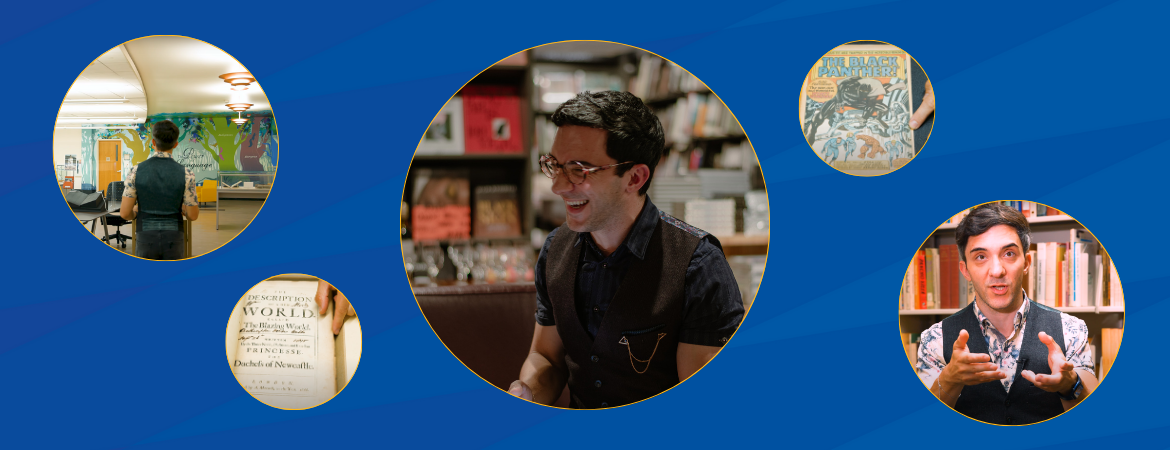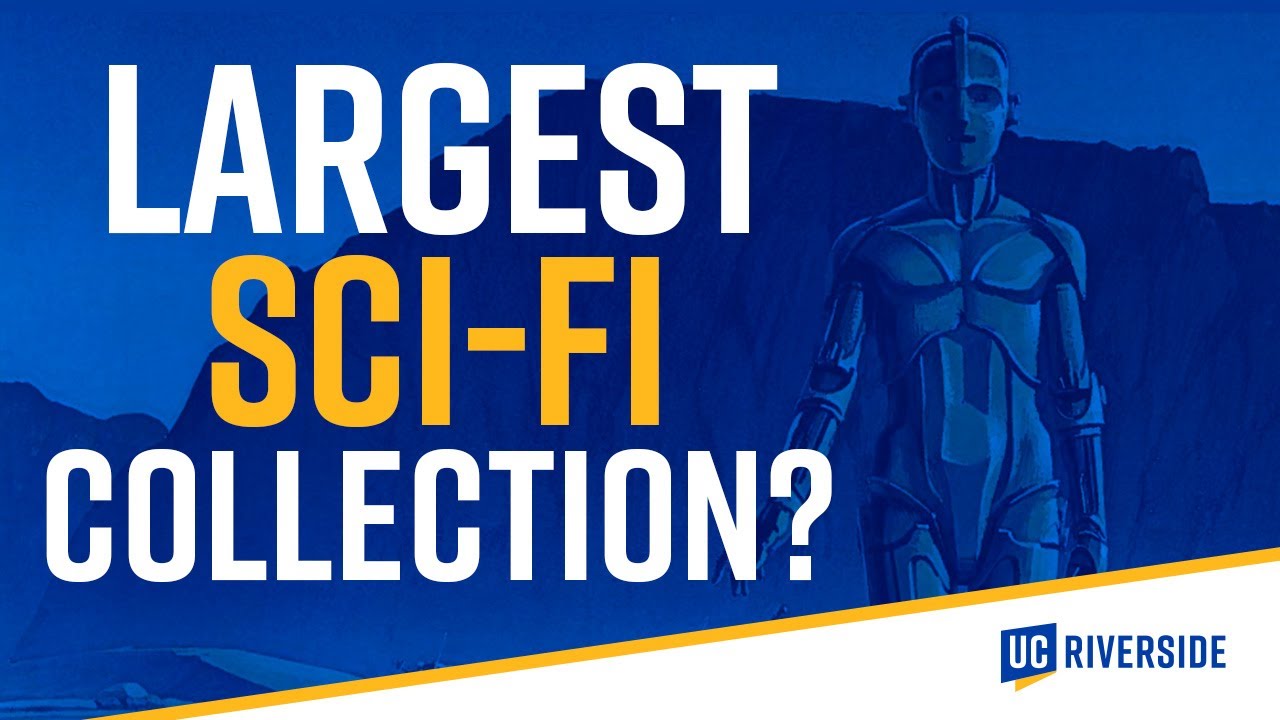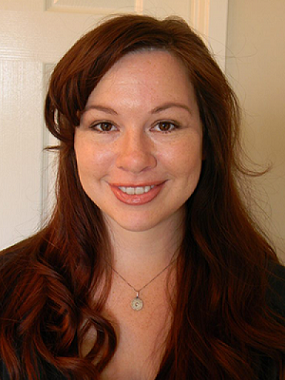Search
Search
Sadakichi Hartmann Papers
Located in: Special Collections & University Archives
Sadakichi Hartmann papers (MS 068)
The papers of Sadakichi Hartmann (1867-1944) document the life, work, and influence of this 20th-century essayist, poet, dramatist, journalist, and critic.
Hartmann was born in Nagasaki to a Japanese mother and a German father and educated in Germany. He immigrated to the United States in 1882 and became a citizen in 1894.
Library coordinator to facilitate award-winning UC program
Access Services Desk Coordinator Leslie Settle recently received her certification as a systemwide facilitator for the University of California.
She joins an elite group of ten people who are certified to provide UC systemwide professional development programs, including the award-winning University of California Women’s Initiative (UCWI) CORO.
At present, Settle is the only UC Riverside-based certified UC Facilitator for the UC Women’s Initiative.
In spring 2018, Settle first participated in CORO UCWI, which aims to establish a pipeline for advancement and to promote women in leadership at the university. CORO exists to open doors to women in any stage of their careers, not just in senior-level positions within the university, Settle explained.
After completing CORO UCWI, Settle was one of four applicants chosen to become a UC facilitator, trained at UCOP through a partnership between CORO and Systemwide Talent Management.
“The biggest transformation, personally, was learning to break my imposter syndrome and value my skills and abilities,” Settle said. “To be put on the same playing field as women whose titles held more prestige than mine, and then realize that they wanted to learn from me, was an honor.”
During CORO, Systemwide Talent Management staff remarked on Settle’s charming use of colloquialisms in facilitating, something she felt would not have been a factor if she had equal professional status to those in management. “This experience helped me to learn that taking constructive feedback means knowing what to adjust and what not to fix, so it doesn’t change who I am,” she explained.
CORO UCWI also helped Settle to achieve greater confidence and skill as a trainer, and increased clarity on her career goal: to become a national leadership program facilitator.
From April to June at UC Riverside, Settle will co-lead CORO’s UCWI 2019 southern cohort, a group of 30 mid-career women from across the UC system who have demonstrated potential for advancement in staff, faculty or academic roles. Topics will include growth mindset, intersectionality, balancing advocacy and inquiry, emotional agility, negotiation, writing professional narratives, and more.
Professional development and mentoring student employees are high priorities for Settle, who also served as the first chair for the UCR Library’s Professional Development Committee. “At work, I get to bring joy to the students I serve and the people I work with. Outside of work, I love to pay it forward. I’m a giver at heart.”
As a UC facilitator, Settle’s role is also to educate people on who is eligible and how to apply for programs like CORO UCWI. “All UCR women employees who have been working in a career position for seven to 10 years – not just at UCR – should be encouraged and welcomed to apply.”
CORO UCWI is sponsored by the Systemwide Advisory Committee on the Status of Women (SACSW) and the UC Office of the President, and administered by Systemwide Talent Management.
What If? An evening with Stu Krieger
On Thursday, Oct. 8, the UCR Library will host an online event with special guest, award winning film and television writer and UC Riverside Professor Stu Krieger.
WHAT IF: Professor Stu Krieger and Professor Erith Jaffe-Berg discuss Krieger's counter-factual history novel THAT ONE CIGARETTE is the third installment of the Faculty Profiles in Research, Art & Innovation series. All members of the UC Riverside community and surrounding areas are welcome and encouraged to attend.
Stu Krieger is an acclaimed screen and television writer making his debut as a novelist with That One Cigarette. He is currently a professor of screen and television writing in the University of California, Riverside’s Department of Theatre, Film & Digital Production and in the Creative Writing for the Performing Arts MFA Program at UCR. Each fall, he also teaches the Producing the Screenplay class at USC’s Peter Stark MFA Producing Program.
Krieger co-wrote the Emmy award winning mini-series A Year in the Life and was nominated for a Humanitas Prize for co-writing the Disney Channel original movie, Going to the Mat.
Among his more than 25 produced credits, Krieger wrote the animated classic The Land Before Time for producers Steven Spielberg & George Lucas and ten original movies for the Disney Channel, including Zenon: Girl of the 21st Century and its two sequels, Tru Confessions, Smart House, Phantom of the Megaplex, and Cow Belles.
He has been a story editor and writer on Spielberg’s Amazing Stories and the supervising producer on the ABC Television series Jack’s Place. He served as the head writer and story editor of the animated preschool series Toot & Puddle on Nickelodeon in 2008-2009. Mr. Krieger’s TEDx Talk, “Choose Joy,” can be viewed here.
On April 22, 2017, Stu Krieger received a Lifetime Achievement Award in Screenwriting at the opening night gala of the 2017 Riverside International Film Festival.
That One Cigarette is a counterfactual history novel following four families from November of 1963 to January of 2009. It is a story of ordinary people making extraordinary ripples in the ocean of life.
In November ’63, Ed Callahan is an assistant manager at the Texas School Book Depository in Dallas. His promise to his wife to quit smoking as soon as he finishes the pack in his pocket ends up changing the course of events on November 22. The fallout of this action alters the lives of the Scott family in Rochester, New York, the Kaufman/Goldman family in Los Angeles and the extended Kashat family in Baghdad, Iraq.
It’s not until the final chapters that all of these lives intersect but along the way That One Cigarette explores questions of fate, love, loyalty and the ability of each of us to make defining contributions to our world by simply being present in our own lives.
Please RSVP in order to receive the link to join the livestream broadcast from 4:30 - 5:30 p.m. Pacific Time on Oct. 8.
More dates for the series will be announced soon.
Affordable Course Materials Initiative saved UCR students $1.5 million
Where there’s a will, there’s a way – and a team of UC Riverside faculty and staff has devoted the last few years to finding innovative ways to make course materials more affordable for our students.
Survey results indicate that the Affordable Course Materials Initiative (ACMI) program has succeeded so far, having saved students more than $1.5 million over the past two years, according to Instructional Designer Nathaniel Wildes.
Wildes calculated these savings by factoring in the current quarter and recurring courses. “On average, it’s a little over $100 cost savings per student,” he said.
He shared these facts and more on Thursday, April 5 at an event called Democratizing Access to Student Success: Student and Faculty Perspectives on Affordable Course Materials, where attendees learned about the local impact of the ACMI since its 2015 launch. Held in the Center for Teaching and Learning on the first floor of Rivera Library, the event was co-sponsored by the UCR Library, the UC Riverside chapter of CALPIRG, and ITS.
“This is a critical social justice issue and one that is especially important on our campus,” said UCR Library’s Director of Teaching and Learning Dani Brecher Cook, who also coordinates the ACMI program for UC Riverside.
Cook’s welcome remarks included statistics from the UCR Basic Needs Working Group, which reported that six out of 10 students experience food insecurity during their time at UCR and may not have sufficient funds to afford textbooks.
A panel of UCR students also shared their personal experiences with high-cost textbooks compared to open-access resources.
Miguel Ramirez, a second-year anthropology major, Vice Chair of the UC Riverside chapter of CALPIRG, and campaign coordinator for the Higher Education Affordability Campaign, ambitiously bought all his textbooks as a freshman. “But I found myself not having enough money to afford three meals a day,” he said. “The average student is expected to pay $1,200 a year in textbooks and school supplies which, for me, is equivalent to almost 3 months of rent.”
Ramirez appreciated that courses using open-access resources gave all students the same opportunity to succeed. “And in my experience as a student, I can tell that my peers in the classroom like it better, too,” he added.
Fifth-year religious studies major and member of Mujeres Unidas Abigail Garcia tried to cut costs by purchasing earlier editions of textbooks or by using eBooks, but found that those alternatives created other challenges. “With older versions of textbooks, I have to make extra efforts to find where the professor is at in my version. It is a lot cheaper, but it doesn’t allow me to be in sync with the rest of the class,” she said. “With eBooks, it doesn’t give me the opportunity to annotate as freely as I’d like to.”
Huma Khan, a first-year business major and CALPIRG member, appreciates the portability of eBooks. “I’m a commuting student, so I would have to carry like 3 textbooks in my bag every day,” she said. However, certain rules during exams can create obstacles students who rely on eBooks or online-only resources. “Sometimes in midterms, teachers are like, ‘Yeah, you can use a book but you can’t use your computer,’” she added.
Both Garcia and Khan have felt frustrated by spending high dollar amounts but only reading one or two chapters in a textbook as well as with access codes. Khan explained, “For my last math class, I had to buy a textbook for the access code and it was $160, and I never even used the textbook.”
“Like a lot of students, I actually went without,” said Semi Cole, ASUCR Vice President of Internal Affairs and a fourth-year political science & public policy major. “I decided to see what I could do, learn what I could from lecture, and just see how it would work. Ultimately, my academics suffered.”
“We need to continue to move forward on this issue and expand to a larger departmental commitment,” Cole added. “We’ve seen from the students here that allowing open source textbooks in the classroom can be successful.”
“It’s deeply appreciated by our students,” said Cook. “It can also lead to innovative and engaging pedagogies.”
Faculty guest speakers included ACMI grant recipients Ruhi Khan, associate professor in media and cultural studies; and Rachel Wu, assistant professor in psychology.
The ACMI was first spearheaded by Chikako Takeshita, associate professor of gender and sexuality studies, and launched at UCR thanks to an $18,000 grant from Computing and Communications. Due to the success of the initial program, in 2016 an additional $150,000 from the Student Technology Advisory Committee established an endeavor that would span three years. At present, the ACMI is in its second year of this longer-term effort.
Guiding the Way: Andrew Morales Helps Students Find What They Need

Andrew Morales, the UCR Library’s Research Services Assistant, has always been passionate about learning and helping others find the information they need.
Growing up in Southern California, Andrew was an avid reader from an early age. “Even in kindergarten, I’d carry books everywhere,” he recalls. “I had memorized some of them because I’d gone through them so many times.”
While he once considered a career in law, Andrew found his calling in libraries. He started as a library page in a public library and worked his way up. “In public libraries, you do a little bit of everything,” he says. “I worked on collection development, children’s programs, adult workshops, and even tax help and computer classes. The variety was great, and it taught me how to meet the diverse needs of a community.”
Now at UCR, Andrew has a mission to help students—particularly those from underserved backgrounds—navigate the research process. “Not every student knows how to research or even where to start,” he explains. “I want to help level the playing field. It’s about showing them how to search effectively, how databases work, and how to find what they really need—not just what comes up first.”
His role involves everything from guiding students through research challenges to coordinating workshops and managing the Library Support and Poster Printing services in Orbach Library. “Sometimes students come in with just their assignment prompt, and other times it’s something bigger—like accessing an old newspaper that’s only housed in a special archive,” he says. “It’s all about helping them break down those obstacles.”
Andrew also brings creativity to student programming through UCR Library internal committees like the one for Finals Week Stress Relief planning. “We’ve done things like food giveaways, trivia games, story hours, and bingo for students during finals. The students are appreciative. It’s nice to see them relax and have fun during a stressful time,” Andrew says.
With a Master’s Degree in Library and Information Science, Andrew’s plan is to eventually become an academic librarian. For now, he’s happy making an impact in his current role. “I’ve always been the person in my family who people turn to when they need information,” he says. “Even if I didn’t know the answer, I’d figure it out. That’s what I try to do for students now—help them overcome obstacles and access the tools they need to succeed.”
Champion of Science Fiction: Dr. Phoenix Alexander’s Role at UCR and Beyond

Dr. Phoenix Alexander, the Jay Kay Klein and Doris Klein Science Fiction Librarian at the UCR Library, has had a whirlwind few months.
Between organizing events, managing the Eaton Collection, and engaging with the local community, his schedule has been packed. "The last few months have been a whirlwind. So much exciting stuff is happening," Phoenix says.
One of the activities that has kept Phoenix busy these last few months was his involvement with the Science Fiction and Fantasy Writers Association (SFWA) and the 2024 Nebula Awards, an awards ceremony recognizing published science fiction and fantasy works, voted on and presented by SFWA.
Phoenix played a crucial role as a volunteer organizer at the awards ceremony held on June 8. “I was a liaison to the Grand Master, Susan Cooper. I also was the assistant to the Toastmaster Sarah Gailey," he says. “I had a headset, got instructions from the back, and made sure people were on stage when they needed to be.”
The 2024 SFWA Nebula Conference, which coincided with the awards ceremony, was held June 6-9 and saw Phoenix speak and serve as moderator for the panels, When Clank! Clank! Meets Pew! Pew!: Combining Fantasy and Sci-Fi Elements and Write Well, Stay Well: Self-Care for Authors.
SFWA is an organization for professional science fiction writers and Phoenix has been deeply involved in the organization, even serving as a member of its History Committee for over a year. “The History Committee helps authors, and the institution itself, with things like records management, providing resources to authors, organizing and preparing their papers for donation to different institutions, and keeping track of the history of the award ceremonies.” Phoenix says.
Phoenix sold his first short story in 2018 and describes his own writing as predominantly science fiction/horror. His stories have been published in outlets such as The Magazine of Fantasy and Science Fiction, Escape Pod, and Beneath Ceaseless Skies. He secured his literary agent, Angeline Rodriguez from WME, after a rigorous process of submissions and queries. “Finding the right agent took about 100 applications, but the persistence paid off,” he says.
Despite his busy schedule, Phoenix remains passionate about his work and the Riverside community. His involvement in local events, such as tabling at the Mini Comic Fest Featuring Black Kirby in Downtown Riverside this summer, highlights his commitment to engaging with the local community.
In August, Phoenix presented at Worldcon, the longest-running science fiction convention in the world, in Glasgow and looking ahead, he will be moderating a panel discussion of science fiction authors at USC Fisher Museum of Art at an event titled Radical Imagination: Queer Stories through Sci-Fi Storytelling.
Do you want to learn more about the Eaton Collection of Science Fiction and Fantasy? Learn about the Eaton Collection from Phoenix in the short video below:
Collection Strategists
Arts and Humanities
Scotty's Story
Mascot's history dates back to UCR's inaugural year
Scotty, the UCR mascot, celebrated his 61st birthday this year, but did you know that his history dates all the way back to the first year that UCR was open for classes?
In November 1954, an election ballot listed six potential campus symbols whittled-down from 67 student suggestions including "The Unicorns." When none of these received a majority vote, the men’s basketball team led a write-in campaign for the "Hylanders." With a brief spelling adjustment, the "Highlanders" came to be the campus nickname. Scotty — originally a pint-sized bear in a kilt and scarf, playing bagpipes with a determined look — became UCR's mascot symbol.
In 1998 the mascot was redesigned with a fiercer image, and in 2010 students voted on a sleeker Scotty featuring a growling bear wearing a Tam O’Shanter. Scotty’s half-blue face plays homage to the Scottish hero William Wallace. For more UCR history, visit the University Archives on the fourth floor of Rivera Library.
Krista Ivy Shares California Citrus History at LA Nature Fest
On Saturday and Sunday, March 18-19, Reference/Instruction Librarian Krista Ivy represented the UCR Library at LA Nature Fest.
Presented by the LA Natural History Museum, LA Nature Fest welcomed more than 30 exhibitors and 7,600 visitors to their Nature Gardens for the festival. Activities included live animal presentations, nature walks, stage performances, nature crafts, bird walks, and expert tips on how to attract wildlife to your garden.
“It was an amazing opportunity,” Krista explained. “We were invited to share information about Riverside's pivotal role in the development of the California citrus industry.” For her presentation, Krista collaborated with rangers from the California Citrus State Historic Park.
Krista's booth included a colorful timeline depicting the significant points in California’s citrus history and when the first citrus trees were brought to California. Krista said "I can’t tell you how many times I heard, ‘Oh I didn’t know citrus wasn’t native to California!’”
For the children’s craft activity, Krista brought coloring pages of citrus-related images from UCR Library’s Special Collections, inspired by the #ColorOurCollections movement.
The citrus crate labels that Krista used to decorate the library’s booth were a crowd favorite. The labels highlighted Riverside citrus brands and were reproductions from a large collection of citrus and fig labels (MS 038) housed in the UCR Library's Special Collections. "People would point to familiar images and relate to the artworks often depicting an idealized time in California history," observed Krista.
The library’s booth was located in a prime spot, which proved to be an excellent promotional opportunity both for the UCR Library and for the UC Riverside campus. “I spoke with several alumni, and some prospective students who were anxiously waiting for their acceptance notification from UCR,” Krista said.
Sabino Osuna Papers
Located in: Special Collections & University Archives
This collection documents the Mexican Revolution through the glass plate negatives, photographs, and lantern slides taken by photographer Sabino Osuna.
Very little is known about Osuna’s life, but he appears to have had a career as a commercial photographer in Mexico City, specializing in portraiture and architectural studies, before the outbreak of civil war.


